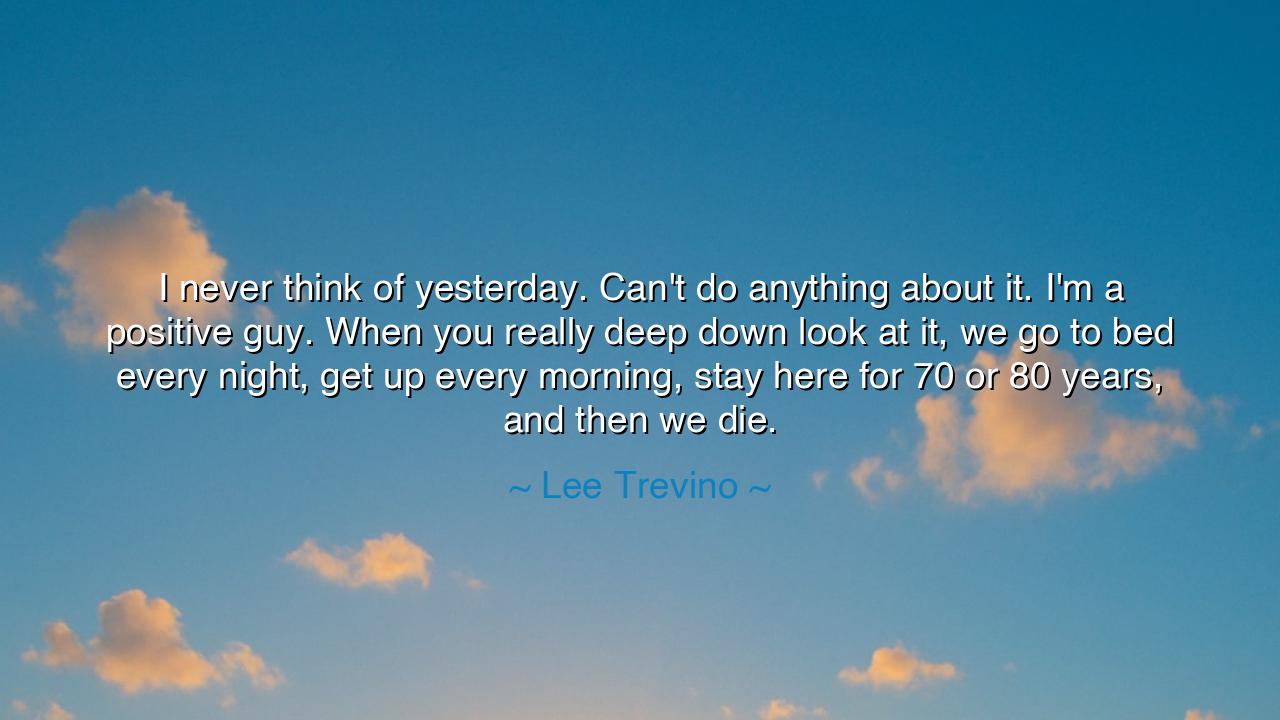
I never think of yesterday. Can't do anything about it. I'm a
I never think of yesterday. Can't do anything about it. I'm a positive guy. When you really deep down look at it, we go to bed every night, get up every morning, stay here for 70 or 80 years, and then we die.






The words of Lee Trevino, “I never think of yesterday. Can’t do anything about it. I’m a positive guy. When you really deep down look at it, we go to bed every night, get up every morning, stay here for 70 or 80 years, and then we die,” strike like a bell of truth echoing across the valleys of life. They are both stark and liberating. In them we hear not despair, but a call to clarity: that the past is gone, the future is uncertain, and all we hold is this moment. Trevino, forged by hardship and elevated by triumph, distills existence into its essence—life is brief, but its value lies in how we live it, not in how long we hold it.
The origin of this thought rests in Trevino’s own life. Born into poverty, he knew struggle from the very beginning. He rose not through privilege, but through resilience, carving his place among golf’s greats with grit and fearless spirit. His philosophy—“don’t think of yesterday”—was not a mere saying, but a shield against despair, against regret, against being chained by what could not be undone. To live positively, he understood, meant refusing to surrender to what was already written, and instead writing anew with each dawn.
History is filled with those who lived by this same creed. Marcus Aurelius, emperor and Stoic philosopher, wrote in his Meditations: “Do not dwell on the past, for it is beyond your grasp; concern yourself with the present, for it is yours to shape.” Like Trevino, Aurelius knew that clinging to what cannot be changed is the path to bitterness. Instead, he counseled acceptance of death and the brevity of life, not as cause for despair, but as fuel for living with honor and purpose.
We may also remember Abraham Lincoln, who endured countless failures—business collapses, electoral defeats, personal loss—yet rose each time, not dwelling on yesterday, but pressing forward toward his greater task. Had Lincoln been consumed by regret, history would never have known his leadership. Like Trevino, he saw that the measure of a life is not in avoiding pain, but in meeting each new morning with courage.
The lesson here is clear: regret is a prison, but acceptance is freedom. Yesterday cannot be remade, no matter how much we mourn or rage against it. Tomorrow is not yet promised. What we have is today—the breath we take now, the choices we make in this moment. To live as Trevino counsels is to free oneself from the weight of the past and to embrace the short span of years we are given with joy and gratitude.
Practically, this means cultivating the habit of presence. When your mind drifts to past mistakes, remind yourself, “It is done—I cannot alter it.” When fear of the future grips you, remind yourself, “It is not yet mine to carry.” Instead, focus on the work, the love, the laughter at hand. Rise each morning as Trevino describes, grateful for the chance to live another day, mindful that 70 or 80 years is but a breath, and determined not to waste it on what cannot be changed.
So, beloved listener, take Lee Trevino’s words as a torch: do not waste your strength on yesterday, nor your spirit on what cannot be undone. Live positively, live presently, live with the courage to embrace each dawn. For one day the years will be spent, and you will lie down for the last time. Let it be said then that you lived not in regret, but in fullness, meeting each morning with the joy of one who knew the precious gift of simply being alive.






AAdministratorAdministrator
Welcome, honored guests. Please leave a comment, we will respond soon